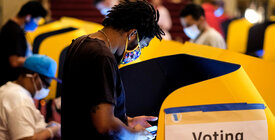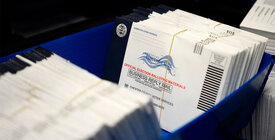Over the years, small donor public financing has emerged as the most powerful antidote to the outsize influence of megadonors in our elections. By enabling and incentivizing candidates to rely on support from constituents rather than wealthy donors, public financing gives everyday Americans a greater say in their elections and government. And as more state and local governments enact new programs or strengthen existing ones, evidence of their benefits continues to grow.
What are the problems with money in politics today?
More and more money floods our elections every year, due mostly to the Supreme Court’s controversial 2010 ruling in Citizens United v. Federal Election Commission. By allowing corporations and other outside groups to spend unlimited money on elections, the Court largely deregulated money in politics and supercharged the influence of wealthy donors and special interests.
Since then, just a handful of megadonors have spent enormous sums to gain access to politicians, influence voters, and push their own narrow agendas. In the 2022 midterms, millions of small donors together gave a record-breaking amount to congressional campaigns, but our analysis found just 100 big donors outspent these millions of Americans by 60 percent.
Further, people from underrepresented communities without access to wealthy networks are often unable to pay the high price of running for office, while those with backing from megadonors can run even with extremist platforms. With no alternative to traditional fundraising, politicians have every incentive to court wealthy donors and prioritize their needs. This imbalance undermines representative democracy and leaves everyday Americans feeling unheard.
What is small donor public financing?
Public financing programs — which are all optional — give candidates who can demonstrate sufficient community support an alternative to fundraising from wealthy donors or special interests. Small donor match systems use public funds to match low-dollar contributions from state or local residents to participating candidates. These programs help candidates build broad bases of support, allow elected officials to spend more time connecting with their constituents, and amplify the voices of everyday voters.
As an example, New York City’s innovative small donor public financing program provides a multiple match on small-dollar contributions to candidates who opt in. The program currently provides a match of eight to one on eligible donations from city residents. That means a $10 contribution receives an $80 public match and becomes $90 for the candidate.
Public financing exists in other forms as well. Some programs offer each qualifying candidate a block grant to fund their entire campaign without private fundraising, as systems in Arizona and Maine have done for decades. Other programs provide vouchers that residents can donate to participating candidates, a system that Seattle pioneered in 2017.
What are key features of successful public financing programs?
They include careful enforcement of candidate rules, ample user support for campaigns, and transparency to preserve public trust. They also cap the total amount of public funds available per office to limit costs. Other features can help ensure that public funds are not wasted on frivolous or noncompetitive candidates. For instance, many programs require participants to be in contested races and demonstrate reasonable levels of support by collecting a minimum number of small donations from constituents before they are eligible. Reduced contribution limits for participating candidates further incentivize these candidates to focus fundraising efforts on everyday people.
What are the benefits of small donor public financing?
Public financing programs help candidates run competitive campaigns fueled by small-dollar contributions, even in the face of huge spending by corporations and special interest groups. Instead of calling lists of rich donors, candidates can fundraise in the community with house parties and barbeques. In Portland, Oregon’s first elections with public financing in 2020, candidates raised a far higher percentage of their funds from individuals rather than special interest groups, just as New York City’s long-standing program has seen. In Seattle, despite millions in corporate expenditures against candidates with grassroots support, publicly financed municipal candidates won four out of the six city council races in 2019.
Small donor public financing also increases opportunities for candidates who historically have faced barriers in private wealth–based politics, such as women, people of color, members of the LGBTQ+ community, and low-income Americans. Our analysis found that in New York City’s 2021 city council primaries, public financing played an important role in addressing historical inequities in fundraising and helped voters elect the most diverse and representative legislature in the city’s history. Public financing programs in Washington, DC, and Maryland’s Montgomery County helped achieve similarly historic gains in diversity among elected officials.
Public financing programs also promote civic engagement by encouraging new and more diverse donors to give, particularly from historically underrepresented communities. In 2018, during the first cycle of the matching program in Berkeley, California, the average contribution was 62 percent lower than in the previous election. After public financing went into effect in Portland, Oregon, contributors were more evenly spread across low-income and wealthier neighborhoods, and a majority of small donors had never given to a candidate for city office before.
Where is public financing in use?
At least 14 states and 25 local governments across the country have enacted public financing programs, covering one-third of the population (click here for the full list and details).
In November 2022, New York State launched its groundbreaking small donor public financing program, following years of research and advocacy that the Brennan Center helped lead. Starting in the 2024 election cycle, the voluntary program provides participating statewide and legislative candidates with a multiple match on small donations they receive from constituents. The program is the most robust legislative response in the nation to Citizens United.
Other states with public financing programs include Connecticut, Florida, Hawaii, Maryland, and Michigan. Localities that have adopted public financing programs include Tucson, Arizona; Los Angeles, California; Denver, Colorado; Miami-Dade County, Florida; and Santa Fe, New Mexico. Other jurisdictions, including Maryland’s Baltimore County and Prince George’s County, are in the process of implementing programs for upcoming cycles.
Is small donor public financing popular?
Yes. Americans across the country and the political spectrum agree that the outsize influence of the wealthy few in our politics harms our democracy, and they demand change. A recent Pew study found that reducing the influence of money in politics is a top policy priority for a majority of Americans regardless of race, age, or political party affiliation. A 2019 Gallup poll found that only one in five Americans is satisfied with our campaign finance laws. These figures reveal a nationwide appetite for campaign finance reform.
The momentum has been especially apparent in New York State. A recent poll by Data for Progress and Stand Up America shows that more than 9 in 10 voters believe wealthy donors have more influence on politicians than the average voter, and 70 percent believe elected officials in New York should prioritize countering the influence of the wealthy in politics. That same poll found widespread support for the state’s small donor public financing program across parties. When informed of the voluntary program, more than 6 in 10 voters expressed support for it.
Public financing has also proved to be popular at the ballot box, with 18 being approved through referendums. In 2022, voters in Oakland, California, approved a ballot measure establishing a voucher program that will provide eligible city residents with $100 in “Democracy Dollars” to assign to their preferred local candidates. In Portland, Maine, a majority of voters approved a measure establishing a fund to provide public financing to municipal candidates starting in 2023.








